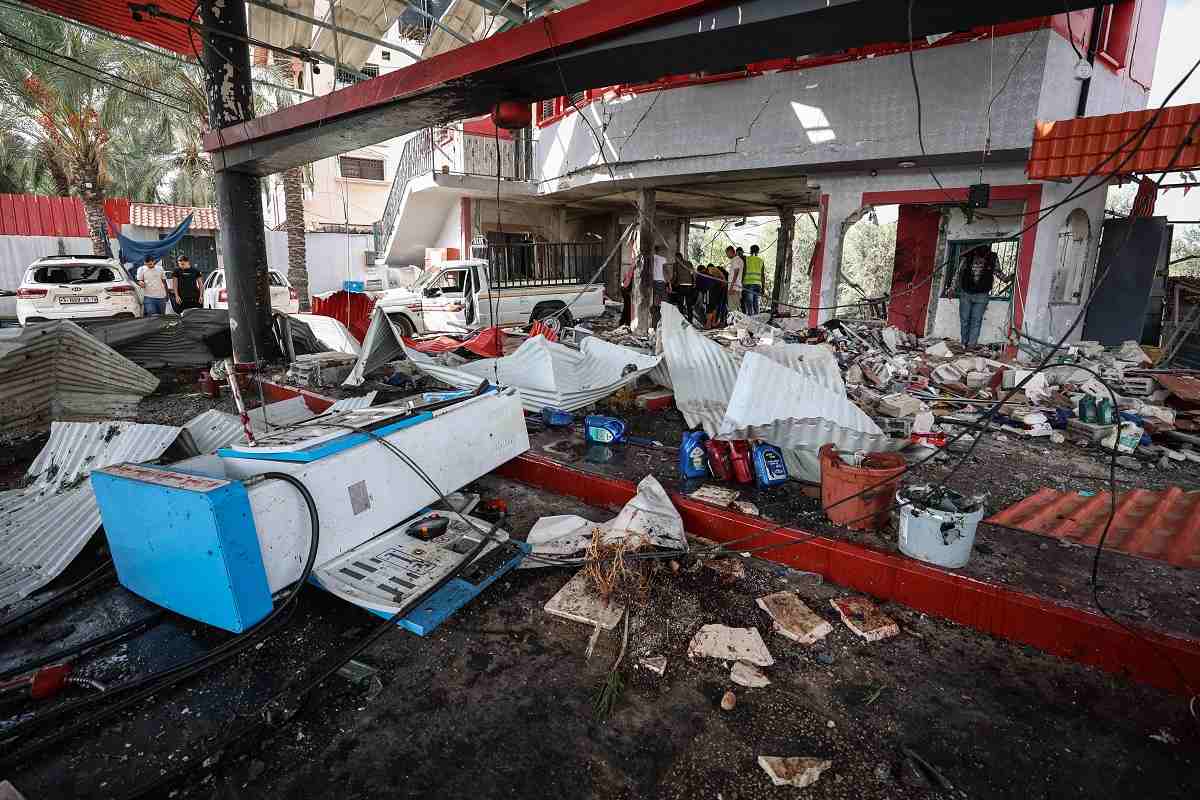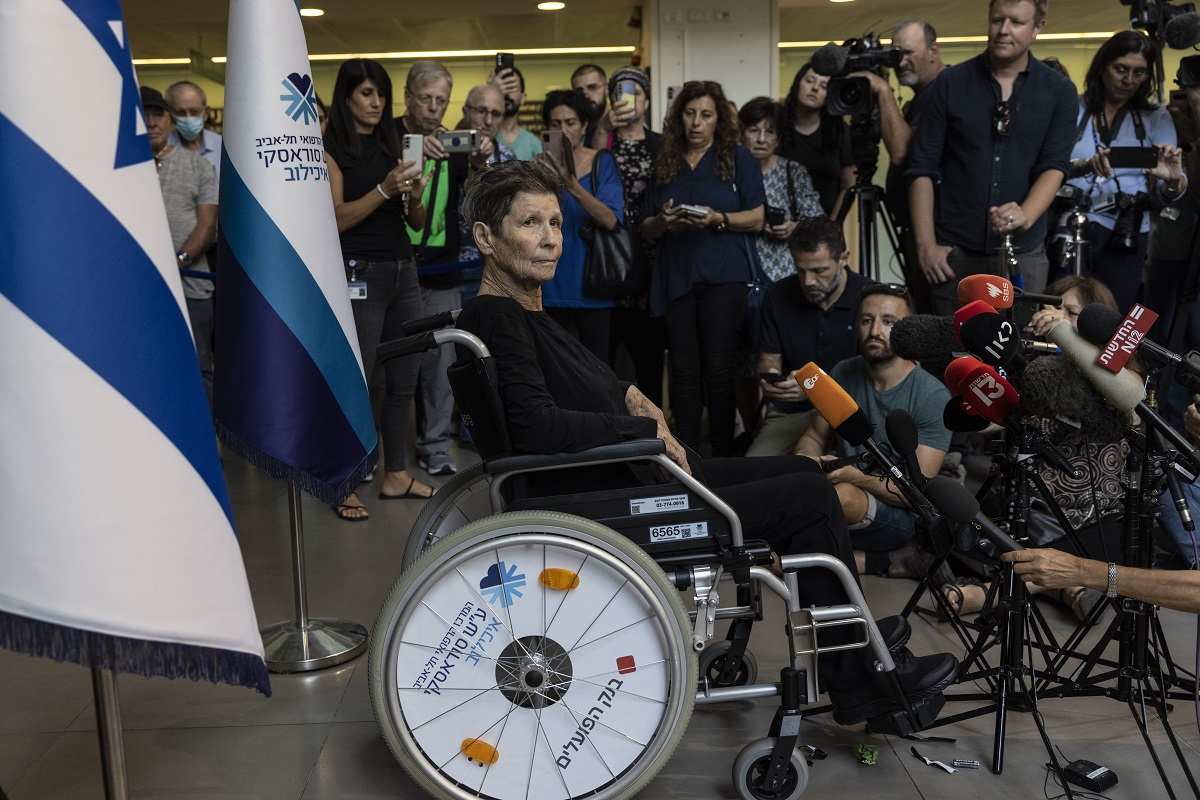
People inspect the remains of a gas station destroyed during an Israeli strike in Khan Younis in the southern Gaza Strip on Tuesday.
14:25 JST, October 25, 2023
TEL AVIV – French President Emmanuel Macron proposed Tuesday that the existing international coalition battling the remnants of the Islamic State in Iraq and Syria could be widened to include the fight against Hamas.
The proposal, made after a meeting in Jerusalem with Israeli Prime Minister Benjamin Netanyahu, reflected the urgency among Western leaders and allies to use any tools available in attempts to keep the war between Hamas and Israel from igniting a wider conflict.
As Macron stood beside Netanyahu at a brief appearance in Jerusalem, the Israeli leader described Hamas as “the new Nazis” and said Jewish children trying to escape Hamas gunmen attacking their communities earlier this month were forced to “hide in attics” just “like Anne Frank” did in Amsterdam during World War II.
Macron pledged that Israel was not alone and that “France is ready for the coalition, which is fighting in Iraq and Syria against ISIS, to also fight against Hamas.”
The United States is part of that coalition. There are currently 2,500 U.S. troops in Iraq and another 900 in Syria. Macron did not offer details, nor did he describe what he meant by “fight” and where that fight might take place. Macron’s office told Reuters afterward that the coalition against the Islamic State “does not limit itself to operations on the ground, but is also involved in the training of Iraqi forces, the sharing of information between partners” and funding to fight terrorism.
American and European officials are wary of the Israel-Gaza war sparking wider regional conflict and dragging other antagonists – including Iran – more deeply into conflict. In his remarks, Macron warned the militant group Hezbollah and its patron Iran against opening a new front on Israel’s northern border, where Israel and Lebanon have both evacuated communities, amid near-daily exchanges of fire. Macron also stressed that “the stability of the Middle East will only be possible if Israel also allows for [a] political approach to the conflict with Palestinians.”
Later Tuesday, Macron traveled to the West Bank to meet with Mahmoud Abbas, president of the Palestinian Authority, a rival of Hamas. Abbas blamed Israel and said that “the countries that support it are responsible for the conflict,” according to France 24.
Macron told reporters that “Hamas does not represent the Palestinian people.” He posted on X, formerly known as Twitter, that the war was “a tragedy for Israelis but also for Palestinians.”
Macron’s appearances coincided with a busy – and tense day – of international diplomacy as the U.N. Security Council met Tuesday in New York. Secretary of State Antony Blinken said the unfolding crisis vividly underscored the need for “an enduring solution” that leads to peace, which Washington and many allies believe must include a recognized Palestinian state alongside Israel. “The only way to break out of this horrific cycle of violence is through two states,” Blinken told the Security Council, adding that “we have no illusions about how hard” it will be to achieve.
Palestinian and Israeli foreign ministers traded graphic descriptions of indiscriminate brutality and slain children. One of the most outraged responses came from Israel, after U.N. Secretary General António Guterres opened the session by condemning the Oct. 7 Hamas attack on Israel but then called for recognition that “the attacks by Hamas did not happen in a vacuum. The Palestinian people have been subjected to 56 years of suffocating occupation.”
His remarks infuriated Israeli diplomats – the country’s United Nations ambassador called on Guterres to “resign immediately.”
President Biden on Tuesday called Saudi Crown Prince Mohammed bin Salman. The two agreed to pursue “broader diplomatic efforts to maintain stability across the region and prevent the conflict from expanding,” according to a U.S. summary of the call. The two spoke as the Pentagon revealed that U.S. troops in Iraq and Syria had been attacked 13 times in the past week.
Earlier Tuesday, an Israeli hostage released the previous night by Hamas, Yocheved Lifshitz, described her “nightmare” ordeal. She said she was thrown over the back of a motorcycle, beaten with sticks and held in a “spiderweb” of damp tunnels after she was abducted from a kibbutz in southern Israel on Oct. 7.
The hostages were taken to a “huge network” of tunnels, she said, and she recalled how they walked for two to three hours in damp passageways until they reached a cavernous hall, where their group of 25 hostages was separated according to which kibbutz they were from.
She said her captors seemed prepared for hostages and had clean rooms with mattresses on the ground. The hostages were treated well, she said, and received medication and regular visits from a doctor.
Sharone Lifschitz, her daughter who is normally based in London, also spoke about her 83-year-old father, Oded, who is still believed to be in Gaza. She told the BBC that her father was “very involved” in campaigning for the rights of Palestinians. “I hope he is being looked after and has the chance to talk. He speaks good Arabic, so he can communicate very well with the people there.”
Watching the wan, fragile Lifshitz, seated in a wheelchair, describing her captivity at a raucous news conference in a noisy hospital lobby, many Israeli tempers boiled – with some especially angry that the former hostage said she had been treated well by Hamas. Hagar Sides, a social media analyst and activist, said the “problematic media event” was an example of “the service the mass media provides to terrorist organizations.”

Yocheved Lifshitz, an Israeli grandmother, 85, who was held hostage by Hamas in Gaza, speaks during a news conference held at Ichelov Hospital in Tel Aviv on Tuesday.
In Gaza, the Israel Defense Forces intensified airstrikes on the enclave overnight, saying Tuesday that it hit 400 targets in the past 24 hours, including a seaside refugee camp that hosted tens of thousands of displaced people.
Ashraf al-Qudra, a spokesman for the Hamas-controlled Gaza Health Ministry, said “dozens” of people were killed and injured in the strike on the Shati refugee camp on the edge of Gaza City. In a post on the ministry’s Facebook account, he accused Israel of committing a “great massacre” at the camp. The Washington Post was unable to immediately verify the reports, though the IDF confirmed there was a strike on Shati.
Overall, the Gaza Health Ministry said more than 700 people were killed in the enclave in a 24-hour span. The ministry said those deaths included 305 children, 173 women and 78 elderly people. The figures have not been independently verified.
The European Union is weighing whether to call for a “humanitarian pause” to allow aid into Gaza. Guterres last week called for “an immediate humanitarian cease-fire” – language that some E.U. countries support, but others don’t. Heading into a European Council summit on Thursday and Friday, the E.U.’s top diplomat, Josep Borrell, called for a “humanitarian pause” to allow “humanitarian support to come in and be distributed.”
But chances for any extended break in the fighting appeared remote. “A cease-fire right now really only benefits Hamas,” said White House National Security Council spokesman John Kirby.
Conditions on the ground in Gaza remained dire. An Egyptian official said Tuesday that the country wants to deliver a higher volume of aid to Gaza, but can’t because of the threat of Israeli bombardment. UNRWA, the U.N. agency focused on Palestinian refugees, warned that it would run out of fuel within two days and would be forced to suspend its humanitarian relief operations. Fuel is essential for powering hospitals, water desalination plants, and other key facilities and infrastructure in Gaza.
At the Shabora refugee camp in Rafah, near Gaza’s border with Egypt, a woman named Hana hunkered down Tuesday in an apartment with 35 members of her extended family. Hana, who spoke on the condition that her last name not be used to protect her privacy, had fled from her home in Rimal, Gaza City’s commercial center, which was badly damaged.
Even though Israel had urged Palestinians to flee south, her location is too dangerous to venture outside, she wrote in a text message. She desperately wants to find a way to reach Ramallah, in the occupied West Bank, to get her children Palestinian passports – and tickets to go elsewhere.
“We are without water and bread for three days,” she said. “We’ve acquired just a very small amount of water. The number of children here is high and they continuously cry.”
Top Articles in News Services
-

Survey Shows False Election Info Perceived as True
-

Hong Kong Ex-Publisher Jimmy Lai’s Sentence Raises International Outcry as China Defends It
-

Japan’s Nikkei Stock Average Touches 58,000 as Yen, Jgbs Rally on Election Fallout (UPDATE 1)
-

Japan’s Nikkei Stock Average Falls as US-Iran Tensions Unsettle Investors (UPDATE 1)
-

Trump Names Former Federal Reserve Governor Warsh as the Next Fed Chair, Replacing Powell
JN ACCESS RANKING
-

Producer Behind Pop Group XG Arrested for Cocaine Possession
-

Japan PM Takaichi’s Cabinet Resigns en Masse
-

Man Infected with Measles Reportedly Dined at Restaurant in Tokyo Station
-

Israeli Ambassador to Japan Speaks about Japan’s Role in the Reconstruction of Gaza
-

Videos Plagiarized, Reposted with False Subtitles Claiming ‘Ryukyu Belongs to China’; Anti-China False Information Also Posted in Japan























